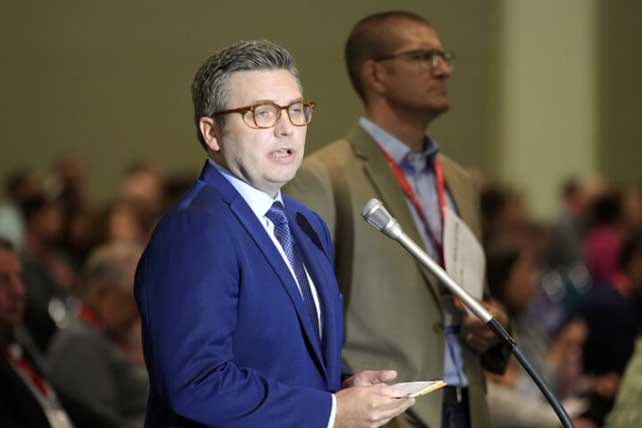(RNS) — Richard Land, who led the Southern Baptist Convention’s Ethics and Religious Liberty Commission for a quarter-century, said he would often remind his staff that if they did their job right, they’d eventually end up in hot water.
“Sooner or later, we’re going to make everyone in the convention mad,” Land recalled in a recent phone interview advising his employees. “When you are the conscience of the convention, you are going to irritate people.”
Land’s adage has applied to many who have led the public policy and ethics arm of the SBC, a job some describe as providing a “prophetic” voice in showing Southern Baptists how to apply their faith to the social problems of the day. Though Land lasted more than two decades, heading the ERLC from 1988 to 2013, eventually it applied to him.
Brent Leatherwood, the current president of the ERLC, lasted only a year and 10 months before getting in hot water. On Monday night (July 22), the executive committee of the ERLC’s board announced he had been fired. The following morning, the entity changed course, announcing that Leatherwood was still on the job. The ERLC’s former chairman, Florida pastor Kevin Smith, was blamed for the “confusion” and resigned.
The episode left Land and other Southern Baptists shaking their heads, but it has also increased questions from some corners of the SBC about the value of the ERLC. At a time when trust in religious institutions is in decline, can the SBC afford the tumult the agency seems to invite?
Had his firing held up, Leatherwood would have been the fifth ERLC leader in a row to leave office amid controversy. From 1960 to 1987, Foy Valentine led what was then known as the Christian Life Commission before being forced out by conservatives who took over the SBC in the 1980s. His successor, Larry Baker, lasted 16 months on the job. Land retired in 2013 after being accused of plagiarism and making controversial remarks about Trayvon Martin, the young Black man killed by a Florida man in a “stand-your-ground” case.
Richard Land at the White House Easter Prayer Breakfast on April 5, 2013. (RNS photo/Adelle M. Banks)
Russell Moore then led the ERLC from 2013 to 2021, before stepping down to join Christianity Today magazine. Moore’s last few years in office were filled with controversy, primarily due to his criticism of Donald Trump and his advocacy for survivors of sexual abuse.
Leatherwood was named ERLC president in 2022, after initially serving as interim. Even before this week’s events, he had drawn criticism for his opposition to legislation that would have jailed women who have abortions and for praising President Joe Biden’s decision to drop his reelection bid.
Like the broader American culture, Southern Baptists have been divided over politics, race and Trump in recent years. That’s made the job of the ERLC leader even more complicated than it was in the past.
RELATED: Former ERLC Chairperson Says He Was ‘Convinced’ the ERLC Had ‘Consensus To Remove Brent Leatherwood’
Baylor University history professor Barry Hankins, who has long studied Southern Baptists, said Leatherwood, though he has seemed to survive for now, likely faces an uncertain future. As ERLC president, Leatherwood’s mandate is to focus on Christian values, rather than politics. “That won’t fly with the hardline culture warriors” in the SBC, said Hankins. “They want an ERLC that’s going to fall in line with the Trumpian right wing.”
Southern Baptists have also become increasingly suspicious of their institutions and their leaders. Since 2018, a pair of top leaders resigned from the denomination’s Executive Committee due to alleged misconduct; one of its seminaries fired a leader for misconduct, was sued by another and announced it had overspent by $140 million; a former SBC president was accused of plagiarism; and the denomination has struggled to resolve an ongoing crisis over sexual abuse.
The SBC isn’t the only faith group whose credibility is suffering. Gallup’s annual survey of confidence in institutions found only a third of Americans have a “great deal” or “quite a lot” of trust in organized religion. That’s better than newspapers (18%), banks (27%) and public schools (29%), but only slightly above the beleaguered Supreme Court (30%).

Pastor Tom Ascol speaks at the Southern Baptist Convention annual meeting in Indianapolis, Tuesday, June 11, 2024. (RNS Photo/AJ Mast)
At the SBC’s annual meeting in June, Florida pastor Tom Ascol, a vocal ERLC critic, made a motion to disband the ERLC entirely, saying the entity “has become increasingly distant from the values and concerns of the churches that finance it.” The motion failed but did get a surprising amount of support, with as many as a third of local church representatives, known as messengers, voting for it.


